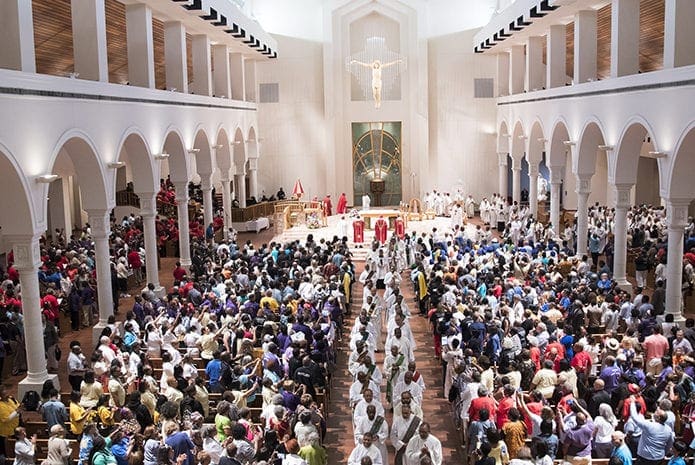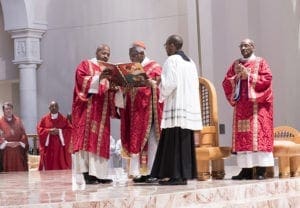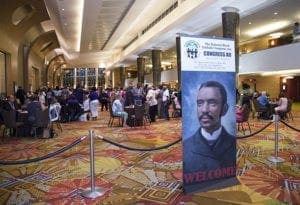 CNS/Courtesy Nancy Jo Davis, National Black Catholic Congress
CNS/Courtesy Nancy Jo Davis, National Black Catholic CongressOrlando
Black Catholics at congress urged to ‘listen, learn, think, act and pray’
By JEAN GONZALEZ, Catholic News Service | Published August 24, 2017
ORLANDO, Fla. (CNS)—United by the words of the prophet of social justice, Catholic Church leaders urged black Catholics to become active, just disciples of Christ.
More than 2,000 converged on Orlando in July for the 12th National Black Catholic Congress where speakers—clergy, lay and religious—addressed a variety of topics and concerns facing black communities and families, while urging those present to take an active, enthusiastic role in living out the Gospel as just disciples of Christ.
Atlanta Catholics were among the participants
For Henry Lubin, 20, a student at Clark Atlanta University majoring in biology, the gathering was unprecedented.
“The experience was amazing. I have been in the Catholic Church my whole life, and I never attended something so powerful. This whole experience helped me change my life and made my faith become more powerful and stronger.”
As a student at the Atlanta University Center, he faces questions about why he doesn’t worship at a black church, he said. Lubin said during the week of the congress he learned about the history of African-American Catholics, as well as how there have been black Catholic leaders since the earliest days. He’ll be sharing those facts.
Said Lubin, “They don’t have to be afraid to say their religion out loud on campus and be a proud black Catholic.”
Sandra Olivari has attended St. Paul of the Cross Church, Atlanta, for 15 years. This was her first experience of the congress.
“I found the congress spiritually rewarding. I had an opportunity to interact with Catholics from around the world. It was illuminating and challenging,” she said.
During his homily at the opening Mass at the Basilica of the National Shrine of Mary, Queen of the Universe, Father Patrick Smith, pastor of St. Augustine Parish in Washington, spoke about the “ridiculous power of the Christ on the cross” and how our own suffering can be offered up to God as a source of healing for others.
It is important the community does talk about its struggles, the priest said, but it also must talk about the redemptive power of God on the cross. He added while “racism ultimately leads to death … a spiritual suicide in our souls,” the truths of the Gospel set lives free.
“That is our anger, but also our source of hope,” he said. “You and I cannot appreciate the good news unless we first face and acknowledge the bad news.”
Young people voiced their concerns
A standing-room-only crowd of young black Catholics in a frank session that lasted more than two hours told bishops, priests, and women and men religious why they stay in the church, what threatens to drive them away and that they want a stronger voice from church officials for the Black Lives Matter movement.

Cardinal Peter Turkson, prefect of the Vatican’s Dicastery for Promoting Integral Human Development, center, celebrates the July 9 closing Mass of the 12th National Black Catholic Congress. CNS/Courtesy Nancy Jo Davis, National Black Catholic Congress
Participants discussed ways to keep young adult black Catholics engaged in their parishes and the church—and raised criticism of, and an apology for, the church’s silence regarding the movement spawned by the killings of unarmed blacks by police.
“How do we respond as people of faith to issues of race that have always been going on in society but especially in light of the Black Lives Matter movement? And in a lot of the police killings, a lot of people feel that the church has been almost silent in its response,” Stacy Allen, one of the facilitators, said toward the end of the session.
“The church is very vocal on a myriad of issues—immigration for instance—which are important,” Allen said. “But specifically on the issues of race, especially from the perspective of a young adult black Catholic, what should the Catholic response be?”
That prompted Auxiliary Bishop Fernand Cheri III, of New Orleans, to stand. With a bow to those in the room, he said, “To the black youth, I apologize to you as a leader of the church because I feel we have abandoned you in the Black Lives Matter movement, and I apologize.
“Partly, I didn’t understand it, and by the time I did understand it, it was too late—the moment was gone,” he said. “I’m very proud of you—you stood up and said enough is enough. As a leader, I want to say that to you—thank you.”
Many at the session spoke of the need to address a lack of programs for young adults and meaningful engagement and leadership opportunities within parishes and the larger church.
“It was good to see how our youth were encouraged, nurtured and recognized throughout the congress,” said Olivari.
Lillie “Bea” Pinckney, a retired licensed social worker, said seeing the young people speak up was tremendous. She attends St. Philip Benizi Church, Jonesboro.
“It was so moving to see the church was speaking to them. It brought me to tears,” she said.
“Race shouldn’t really play a part of it, but it does. We have to come together. We have to make it better like Jesus wants us to. Racism is a sin.”
Participants from Nigeria and other African nations shared their experiences of encountering cultural differences assimilating into U.S. parishes, the lack of welcome and some of the strong communal faith traditions they know from their homelands.
Programs focused on prayer and spiritual, not just social, needs are important, participants said.
Congress goes back 128 years
The roots of the Black Catholic Congress stem from 1889 with layman and journalist Daniel Rudd, who brought together 100 black Catholic men to exchange and discuss questions affecting their race for not just Catholic blacks, but blacks across the country, and unite for a course of action while standing behind the Catholic Church and its values.
“Black Catholics are born from the same womb of the baptismal font,” Father Smith said, adding that those gathered for the congress did not convene to achieve higher status, but rather to insist on “inclusion” because black Catholics are equal members of the body of Christ.

Participants are seen July 9 during the 12th National Black Catholic Congress in Orlando, Fla. CNS/Courtesy Nancy Jo Davis, National Black Catholic Congress
“And also, more importantly, (we gather) to extort and challenge ourselves to do our part and accept the responsibility in our role in the Church that God has given us. … We gather to see how to effectively evangelize because eternal life is way too important.”
A united community
Ghanaian Cardinal Peter Turkson, prefect of the Vatican Dicastery for Promoting Integral Human Development, offered the opening keynote address that focused directly on the theme of the congress taken from the prophet Micah—“The Spirit of the Lord is upon me: Act justly, love goodness and walk humbly with your God.”
His first point reaffirmed the united community of disciples of Christ and the need of inclusion of all “children of God.”
“When Pope Francis speaks, he doesn’t speak to nations, races and tribes; he speaks to humanity invited to be disciples of Jesus. And we respond first and foremost to this,” Cardinal Turkson said. “For there is no Gospel for Africans. There is no Gospel for Americans. There is no Gospel for Italians or Europeans. There is one Gospel for all of us created in the image and likeness of God we seek to respond to. … God’s children all belong together. None are set aside, none should live on the periphery and none are excluded.”
Gonzalez is on the staff of the Florida Catholic, newspaper of the Archdiocese of Miami and the dioceses of Orlando, Palm Beach and Venice. Andrew Nelson, of The Georgia Bulletin, contributed to this story.